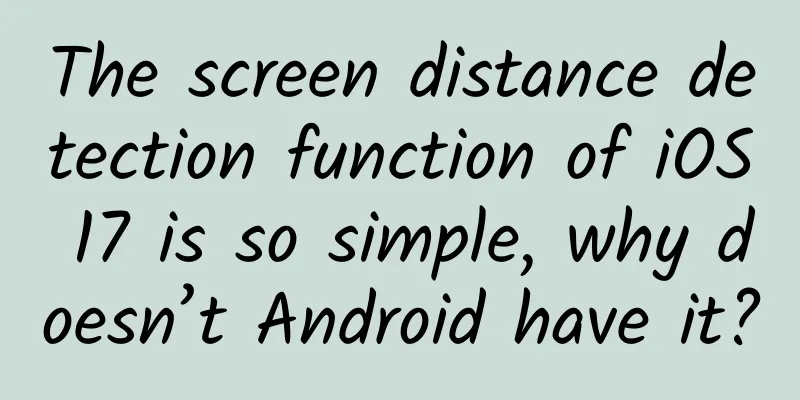The screen distance detection function of iOS 17 is so simple, why doesn’t Android have it?

|
Just last week, Apple released many new systems including iOS 17, iPadOS 17 and macOS Sonoma. I wonder if you have been able to get the developer beta updates as soon as possible? It doesn’t matter if you don’t have it. Although iOS 17 has updated a lot of new features this time, due to different usage habits, many of the new features are actually not very relevant to our domestic users. However, iOS 17 has an interesting "hidden" feature. In the system "Settings" - "Screen Time" page, you will find that iOS 17 has an additional feature called "Screen Distance" compared to 16. When we turn on this feature, iPhones with Face ID can measure the distance between the screen and the eyes through the front camera. If you hold your iPhone too close while playing with it for a while, the system will remind you to keep it "an arm's length away" to help you relieve eye fatigue and protect your vision. What can I say about this function? Although it is not some kind of black technology, it is quite user-friendly. Especially for children who have no concept of protecting their eyesight, it can also play a supervisory role to some extent. Many netizens on Xiaohongshu even reported that they didn’t realize how close they were to their phone screens until they saw a pop-up reminder: And to be honest, I actually didn’t notice that my phone usage habits were so bad. The too-close reminder popped up at least seven or eight times a day, and I almost wanted to turn it off because of it. . . At this point, I know that some of my friends will be curious about why such a thoughtful feature is only available on iPhone but not on Android. Are there any technical difficulties that these mobile phone manufacturers cannot overcome? In fact, this new feature launched in iOS 17 is most likely to achieve distance measurement through data collected by the iPhone’s front sensor. Because Apple specifically made a note about privacy protection at the bottom of this feature page, stating that the camera will not take images or videos, and the data will only be kept locally and will not be shared with Apple: Considering that this feature is only supported on iPhones and iPads with Face ID, I guess that in addition to the front camera, there should be other sensors such as distance sensors involved in the distance measurement: Of course, distance reminder can actually be achieved with just a front camera. After all, the eyes are on the head. As long as the camera is used to capture the size of the head, it can basically determine how close the eyes are to the phone screen. You can see that many learning tablets equipped with front cameras on the market have already been equipped with this function, but their detection accuracy may not be as accurate as Apple's: It is also easier to achieve similar functions on Android phones. Because Snapdragon 8 Gen 2 actually has a built-in ultra-low power always-aware ISP that supports AI, even if we don’t unlock or wake up the screen, the front camera of the phone can still be always online. This way, the phone can achieve functions including but not limited to automatically locking the phone when it detects that you are not looking at the screen, and automatically turning off message notifications when it detects that someone is peeping at your screen: You can even use your phone to scan the QR code directly in screen-off mode. But after some searching, I found that, except for OPPO which provides the air gesture function in the system, other Android manufacturers such as Xiaomi and vivo do not seem to use this hardware to create new features: As for the reason, I guess it may be because manufacturers feel that although these functions can run with low power consumption, they will still increase the power consumption of the mobile phone, thus affecting the battery life of the mobile phone, so they simply don't add them. On the other hand, it may also be a consideration to keep the camera on all the time, a prerequisite that makes people feel uncomfortable just by hearing it. Although the information collected by the camera will also be securely stored and will never leave the sensor hub, everyone believes that Apple can protect everyone's privacy, but they don't believe that Android can do the same. Of course, there is another possibility, that is, Android manufacturers simply think that this function is somewhat useless and therefore did not launch it. As for the reason, only the manufacturers themselves know. |
<<: Microsoft Xbox says it won't get involved in VR right now because the market isn't big enough
>>: Microsoft Bookings mobile app will no longer be available starting July 15
Recommend
Tencent Advertising Guide for the Dental Industry
1. Oral Industry Research 1. Overview of the dent...
Manufacturers face difficulties, but the domestic smartphone market is far from saturated
It is obvious that domestic smartphone manufactur...
How much is the market price for a pound of bull whip? How much does a pound of bull whip cost now?
Influenced by traditional Chinese culture, people...
Why Apple, which is widely criticized, can still easily beat Samsung, Huawei and Xiaomi
It is well known in the technology circle that Ap...
Let's have a barbecue on May Day. Let's take a look at some interesting facts about barbecue.
As the weather warms up The barbecue industry is ...
WeChat has hidden Easter eggs! Emojis and symbols can convey "mysterious messages"
WeChat translation reveals Easter eggs. In the pa...
Is the "quantum dot TV" that was popular in 2015 worth buying?
At the end of the year and the beginning of the n...
What is the Winter Olympics weather service? | 50 days to go
December 16, 2021 "50 Days Countdown to Wint...
WHO experts talk about the turning point in Wuhan: When will the turning point of the Wuhan epidemic occur?
As the number of newly confirmed cases in Wuhan d...
Why has the Nanpu Bridge, which is over 30 years old, become so popular?
Recently, a video of Nanpu Bridge went viral onli...
Why does my throat feel bitter after putting in eye drops?
Audit expert: Liu Dongbao Chief Physician of Opht...
Summary and comparison of the three major free new media channels for increasing APP downloads!
The ultimate goal of new media for APPs is to dri...
What does the easternmost part of China look like?
2008 Heixiazi Island, which has been drifting for...
Are the "gerbils" that drink water with their ears in "Dune 2" real?
The cute "Jerboa" that appeared in the ...
Everything grows on sunlight? Deep-sea creatures: Guess how I survived
As the saying goes, "everything grows with t...









